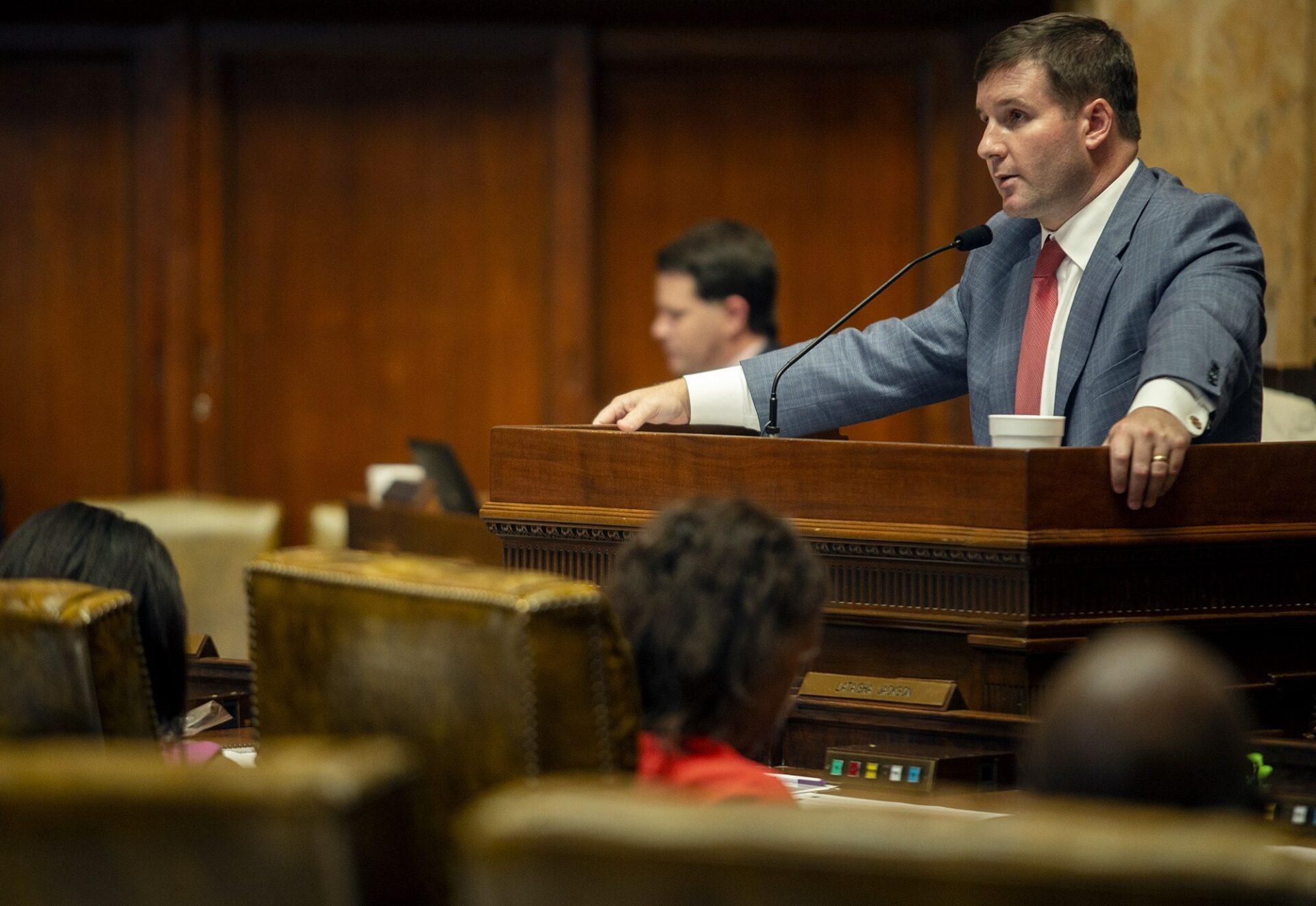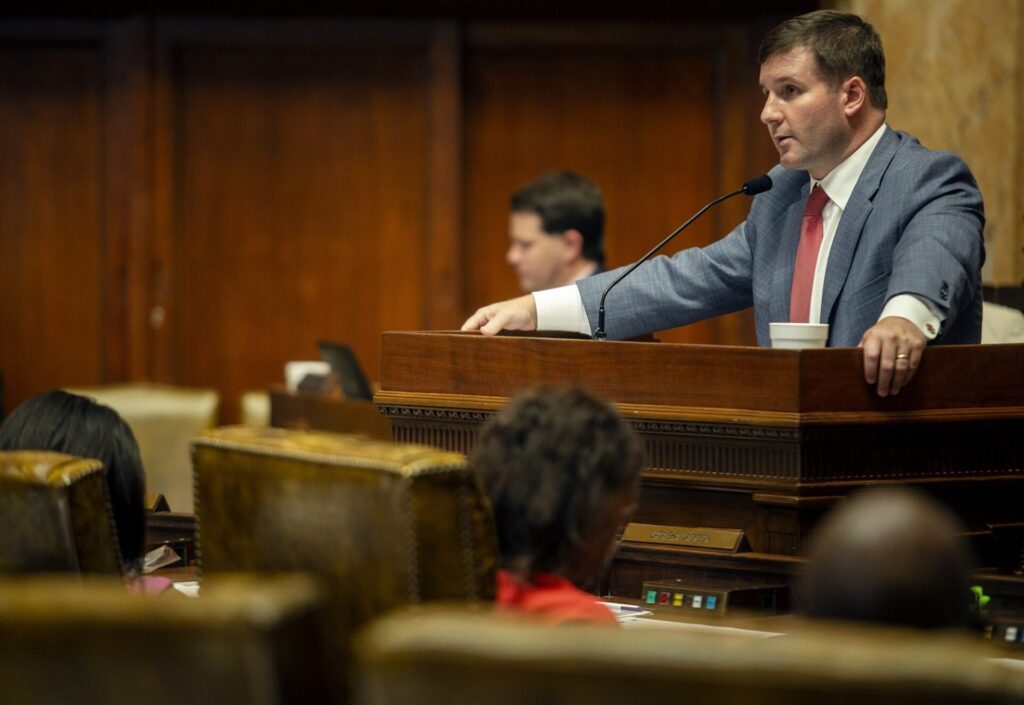Business
Mississippi House Moving to End State Income Tax, Raise Sales Tax


Bobby Harrison and Geoff Pender/Mississippi Today
The House Ways and Means Committee on Monday passed a bill that would eliminate Mississippi’s personal income tax within a decade and reduce the state’s highest-in-the-nation tax on groceries while raising the sales tax and other taxes.
The landmark tax bill was authored by the three highest-ranking House Republicans: Speaker of the House Philip Gunn, Pro Tem Jason White and Ways and Means Committee Chairman Trey Lamar.
“This is a much fairer tax structure,” Lamar said, adding that the bill is essentially revenue neutral. Lamar said that the leaders drafted the bill in hopes it would garner bipartisan support. It passed the House Ways and Means Committee on Monday with no dissenting votes, including from the several Democrats on the committee.
The bill would immediately eliminate the personal income tax for individuals making under $50,000 a year and for married couples making less than $100,000. It would totally phase out the state’s personal income tax over a 10-year period if revenue growth standards are met. If the growth standards are not met, the tax cut for that year would be delayed.
In addition, the 7% tax on groceries would, as of July 1, be reduced to 4.5% and ultimately reduced to 3.5%. Cutting the state’s grocery tax has long been a top stated goal of legislative Democrats.
Other taxes would be increased to make up for lost revenue from the proposed cuts. The general sales tax on other retail items, which is currently 7%, would be increased to 9.5% starting July 1. The sales tax on vehicles, currently 5%, would be increased to 7.5%. Essentially, all items currently taxed at 2% or 3%, such as some farm implements, would be increased by 2.5%.
The 68 cents per pack tax on cigarettes would be increased by 50 cents. Taxes also would be increased on other items such as alcohol.
Lamar said a person making $50,000 per year would receive an immediate savings of about $2,030 and would have to spend more than $82,000 on items to pay as much in sales taxes as they would be saving in income taxes.
White also stressed that the legislation would ensure that the revenue municipal governments lost from the reduction in the grocery tax would be replaced by the state. Local governments receive a portion of the sales tax revenue collected within its borders.
Lamar said he hopes to bring the bill up for House vote on Tuesday. If the bill passes there, it will move to the Senate for consideration.
In addition to taking up the massive tax bill, legislators, facing a tight deadline from time lost to last week’s unprecedented winter storms, hurriedly passed a first draft of a $20 billion state budget Monday afternoon.
Lawmakers have until Wednesday to pass about 100 appropriations bills out of the originating House or Senate and on to the other chamber. Wednesday is also the deadline for first passage of legislation dealing with taxes.
Gov. Tate Reeves proposed phasing out the state’s personal income tax — which generates nearly $2 billion a year, or a third of the state’s general fund — before the session began. But he did not offer any tax increases to offset the lost state revenue.
Gunn and members of his leadership team in the House had proposed in earlier sessions phasing out the income tax. At that time, they wanted to tie the phase-out to an increase in the gasoline tax, but Reeves, serving as lieutenant governor at the time, rejected that proposal saying he opposed any tax increases, even if they were swaps.
The bill passed out of House Ways and Means Committee Monday does not change the tax on gasoline.
A spokeswoman for Reeves did not return a request for comment on Monday.
Working to get back on schedule on Monday, the House and Senate Appropriations committees passed most budgets at the amount approved this fall by the members who serve on the Joint Legislative Budget Committee. That makes most budget bills placeholders at this point. Later in the legislative process in March, House and Senate leaders will work out final budget numbers the full chambers can accept or send back for further work.
“This is our first crack at looking at our expected revenue and the expectations we have for our state agencies,” said Sen. Briggs Hopson, the Vicksburg Republican who chairs the Appropriations Committee. Recent projections are that state revenue is running at least $300 million above earlier projections, despite the continuing global pandemic.
Senate Appropriations Committee on Monday passed a couple of exceptions to the placeholder numbers. It approved a $51 million increase to the main public education budget to cover a roughly $1,000 pay raise for teachers — a proposal the Senate passed earlier this year — and it shifted $6.4 million from the Department of Finance to the Department of Public Safety for DPS to take over control of the Capitol Police, which the Senate likewise has already passed.
Hopson warned his committee colleagues that they’ll likely have to deal with several deficits from state agencies — although those numbers aren’t yet nailed down and the “deficit bill” was passed as a placeholder.
Sen. Sollie Norwood, D-Jackson, asked Hopson: “Are we setting the budgets too low, then they have to come back for deficits, or are they not operating efficiently enough?”
Hopson noted that the Department of Corrections and Medicaid often have large deficits, and setting their budgets is difficult because their expenses are “moving targets.” But he said other agencies that don’t live within their budgets will have some explaining to do.
“One thing I’ve said to agencies … deficits are for unseen problems,” Hopson said. “I’m not going to be real sympathetic to any agency just coming in expecting deficit spending for things they should have expected.”
The total state budget, including federal funds, is about $20 billion. Another large slice of the budget is funded through special funds — specific fees or taxes to run individual agencies, such as the gasoline tax that is the primary state funding source for the Mississippi Department of Transportation.
The $6 billion state support budget is the portion of the funding pie where legislators have the most discretion in how funds are divvied up for education, health care, law enforcement and in other areas.
BOBBY HARRISON
Bobby Harrison, Mississippi Today’s senior capitol reporter, covers politics, government and the Mississippi State Legislature. He also writes a weekly news analysis which is co-published in newspapers statewide. A native of Laurel, Bobby joined our team June 2018 after working for the North Mississippi Daily Journal in Tupelo since 1984. He is president of the Mississippi Capitol Press Corps Association and works with the Mississippi State University Stennis Institute to organize press luncheons. Bobby has a bachelor’s in American Studies from the University of Southern Mississippi and has received multiple awards from the Mississippi Press Association, including the Bill Minor Best Investigative/In-depth Reporting and Best Commentary Column.
GEOFF PENDER
Geoff Pender serves as senior political reporter, working closely with Mississippi Today leadership on editorial strategy and investigations. Pender brings 30 years of political and government reporting experience to Mississippi Today. He was political and investigative editor at the Clarion Ledger, where he also penned a popular political column. He previously served as an investigative reporter and political editor at the Sun Herald, where he was a member of the Pulitzer Prize-winning team for Hurricane Katrina coverage. Originally from Florence, Mississippi, Pender is a journalism graduate of the University of Southern Mississippi and has received numerous awards throughout his career for reporting, columns and freedom of information efforts.
















